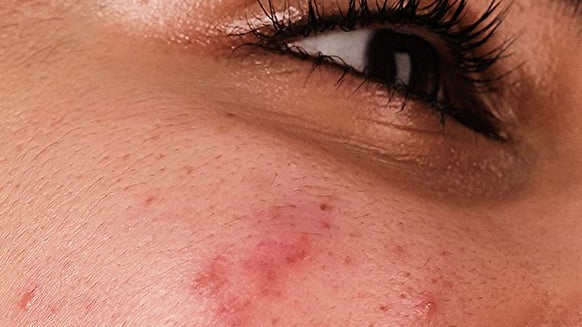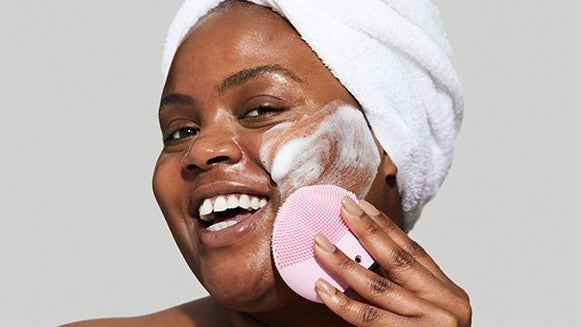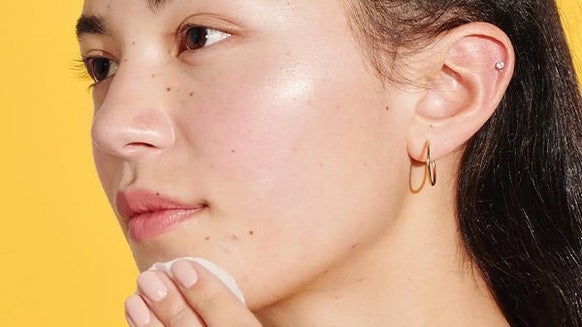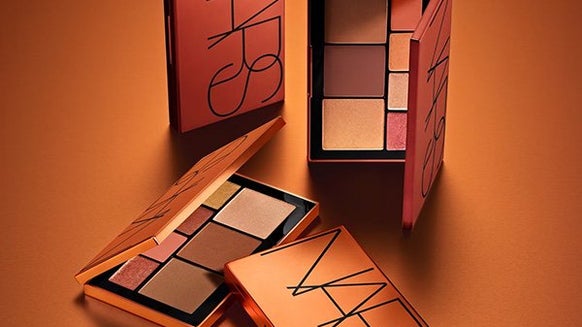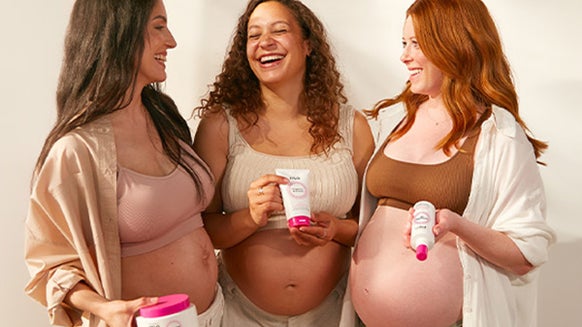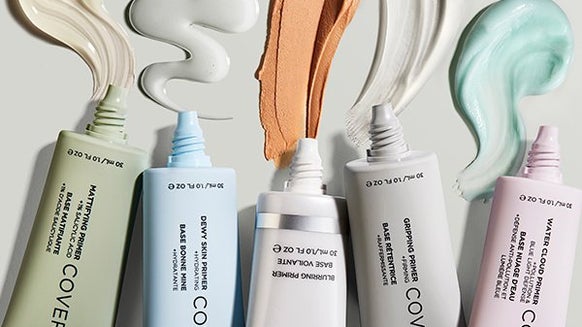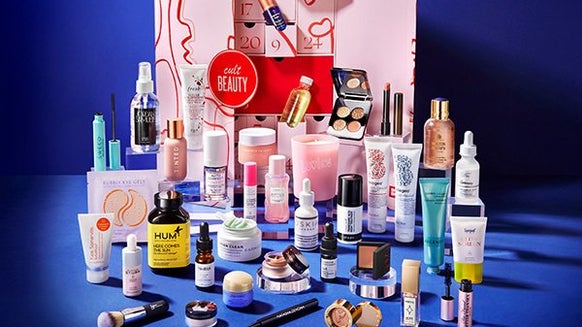She’s so Cult: Colette Haydon of LIXIRSKIN
Warm and wonderfully witty, there's nothing not to love about Colette Haydon - the formulator of your favourite skin care staples and creator of the peachy-pink confections you'll have spied on all your Insta-gurus #shelfies. We caught up with Colette about her attitude to skin care, how to streamline your regime and why you need to mix things up to keep skin 'guessing'... Frank, funny and fabulously French, speaking to Colette feels like you're chatting to your favourite female friend - our chat was so enthusiastic that we practically ended one another's sentences (#TeamCB have developed quite a 'girl crush' (not to mention a skin care obsession)): let's just say you need to be prepared to fall in love and start a {LIXIRSKIN} addiction...
{Cult Beauty} Hi Colette! Could we please kick things off with a bit of the {LIXIRSKIN} story? Where did the concept come from and what differentiates it?
{Colette Haydon} I'm a product developer and consultant and was working with a lot of well-known beauty brands creating skin care formulations when I started to identify a 'shift' in attitudes to skin and beauty. I think there's new demand for the simplicity I've brought to {LIXIRSKIN} - a small, uncomplicated range of potent, science-driven products that deliver. There's nothing 'basic' about it - instead it's advanced but relaxed. When I see all the marketing spiel that accompanies products I think 'what the...?' - a regime doesn't need to be complicated! I believe transparency is key and, disappointingly, an all-too-rare commodity...
I’m interested in chemistry, in the science of the skin, but I believe some of the lingo people use can be a little bit pedantic – you practically need a chemistry degree to read the label! {LIXIRSKIN} is a reaction to the minefield - I want to make the whole selection process simple.
{CH} The packaging is geared towards our hectic lifestyles – we lead increasingly jet-set lives with endless business trips and minibreaks, which is why I created a ‘big’ tube for home, and a ‘mini’ to keep in your hand luggage. When I developed {Universal Emulsion}, I wanted to create a cream that works all over – it’s for your eyes, your face, your neck, décolleté, arms, hands… why should you use a 'less good' cream for hands than for your face? I was getting a bit fed up – I just wanted ONE cream for all skin, at all times.
{CH} Vitamin C is a fabulous molecule but it fell out of favour for a while because its synthesised and everybody wanted 'natural'. Problem is, the truly active ascorbic acid (vitamin C) is lab-derived and there is absolutely NOTHING wrong or dangerous about that. The chemistry behind it is ‘green’ but no, it doesn’t grow on trees. The clever thing about my {Vitamin C Paste} is that I use straight-up, simple L-ascorbic acid at 10% but, because of the consistency the 'active' won't degrade. Vitamin C is notoriously unstable, but I've found a way to maximise the purity and efficacy.
Why do you need it? Well, as well as being an excellent antioxidant (it deflects free radical attack), vitamin C is proven to help regulate your melanin to combat pigmentation and unify your skin tone. A co-factor of collagen production, it also helps to firm and fortify but, arguably its greatest attribute, is its ability to lift the daily 'grey' that comes with everyday exposure to the elements.
It reduces the oxidised sebum and dirt to effectively wipe the slate clean - a bit like with blonde hair. When highlights begin to look brassy or green-ish, its vitamin C that's entrusted to restore its post-salon vibrancy and the same goes for skin. Use the paste as a morning-time flash mask - it brightens and refines to boost your 'feel good factor' while ensuring that your make up glides on seamlessly.
{CH} A few years back, we made the distinction between ‘synthetic’ and ‘natural’ but really, all we want is efficacy. The debate has become a bit dated - especially now that so many ranges are removing the typical 'nasties'. Which isn't to say that no 'nasties' means brands have created a basket of fruit, but I think everybody deserves something free from potentially toxic or damaging additives. {LIXIRSKIN} is free from any parabens, phthalates (the usual suspects) but it isn't a 'natural' brand; everything is chemistry and sadly, game-changing ingredients don't grow on trees. Things have swung too far towards the 'organic' end of the spectrum and I think that clued-up customers have started to identify that the results they crave don't come from coconuts alone.
{CH} Good skin doesn’t mean flawlessness – wrinkles are no longer thought of as bad. There’s a shift towards beauty with personality – defining your own definitions of beauty – it’s okay to look older. No age group wants to be dictated to – we're beginning to balk at the idea we ought to look younger and I’ve tried to create an ageless brand – there is no age that isn’t going to benefit from good skin care. I hate to preach skin care to the very young, but with conscientious decision-making we can really prolong our skin’s vibrancy.
Use pure molecules with clinical studies that work – retinol, AHAs and vitamin C, hyaluronic acid, omegas – cleansing is the MOST important step (use a multi-tasking cleanser like {Electrogel} to purify your skin), and use your chosen active individually for any given period.
Skin cells are like brain cells – they have a limited amount of energy to do some jobs. The skin is working – it’s at work – there’s energy, then when there’s no more energy, it cannot utilise the actives. You give me ten jobs, I might success in doing two, but badly. I’m running like a headless chicken – starting everything but finishing nothing. Our skin cells are the same, which is why it’s much better to use one thing at a time, than to bombard (and bewilder) your cells with an onslaught of actives all vying for 'bandwidth'. Ask your skin to do one thing and do it well.
When you pick up a serum that's loaded with actives and packed with ten different peptides – you’re exactly in the scenario where your skin is confused; you're asking too much of your cells which means they cannot take advantage of the benefits. It's much better to mix - or 'switch' - things up. Use retinol consistently for three weeks, then swap to something else instead of layering or alternating every evening. With very active, pure molecules your skin will saturate after a while – you reach the 'plateau effect'. So, for example, if you use retinol – stick to it for two-four weeks – then switch to something else. There’s a fine line between using something too little and for too long – it might take some experimenting but you'll get there.
{CB} Acne is also an increasingly common problem amongst women who imagined they’d have ‘outgrown’ breakouts. Do you have any advice for those who’re struggling with fine lines *and* blemishes, or battling post-acne scars and pigmentation?
{CH} First of all, and we really need to stick to this across the board, when you have ladies (young ones in particular) who’re suffering from acne, it’s a clinical condition – you need to consult a doctor. The term ‘acne’ is a medical condition – problem skin is the term I prefer to use. Open pores, blackheads, breakouts – I think women got a little bit fed up with all these fancy skin types – a little bit dry, a little bit sagging, a little bit ageing – there are two skin types: the old and the young. Generally speaking, the young ones tend to have the spots, the old ones want to tackle wrinkles.
Always at night with the {Night Switch Retinol} – retinol is the skin's 'regulator'. It’s going to help the wrinkles, refine the epidermis as well as to boost the production of protein to give you more density in the dermis. It’s actually also a very very very good sebum regulator. Prescription products – roaccutane etc. are vitamin A – while the {BHA/AHA} is also great for problem skin. Mix them up but use religiously for three-ish weeks.
Use {Night Switch BHA} and apply directly to the affected area and then use {Universal Emulsion} on top. With problem skin, very very often they want to use it on a specific part of the face. So rather than with {Retinol} or {PHA}, use {Night Switch BHA} directly on ‘problems’. Always at night - acids and sunlight don't mix very well.
The {Night Switch PHA/AHA} is a cocktail of lactobionic acid (polyhydroxy) – a potent antioxidant – phytic acid (to detox) and lactic acid – a component of skin’s NMFs (natural moisturising factors). There is a synergy between these acids, so it’s beneficial to combine them in this 'intelligent' blend which exfoliates gently, brightens pigmentation and boosts cell turnover to restore misplaced radiance.

Cult Beauty’s Content Editor and a Cult Beauty OG, Verity loves nothing more than the marriage of language and lip balm. A quintessential Libran, she’s a self-professed magpie for luxury ‘must-haves' and always pursuing the new and the niche — from the boujee-est skin care to cutting-edge tech. Balancing an urge to stop the clock with her desire to embrace the ageing process (and set a positive example for her daughter), Verity's a retinol obsessive and will gladly share her thoughts about the time-defying gadgets, masks and treatments worth the splurge...
